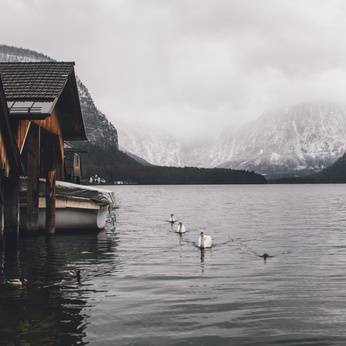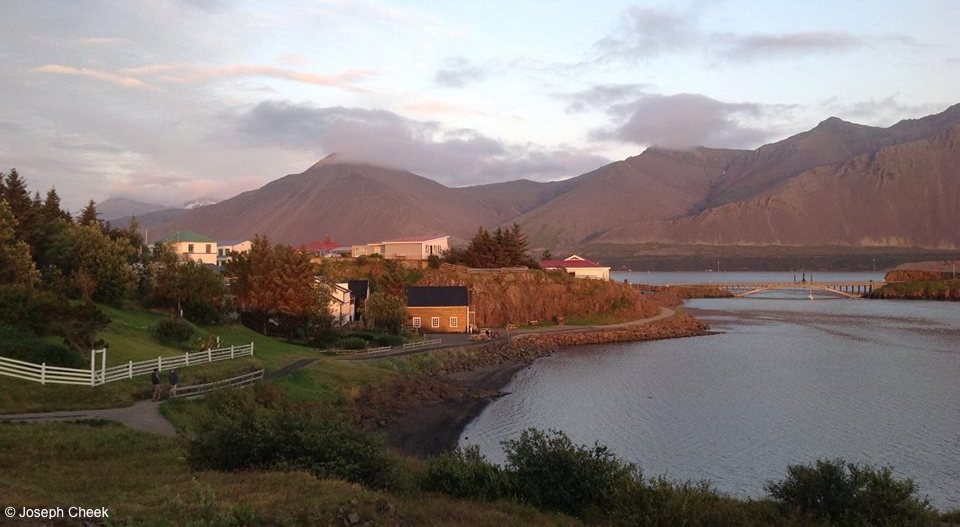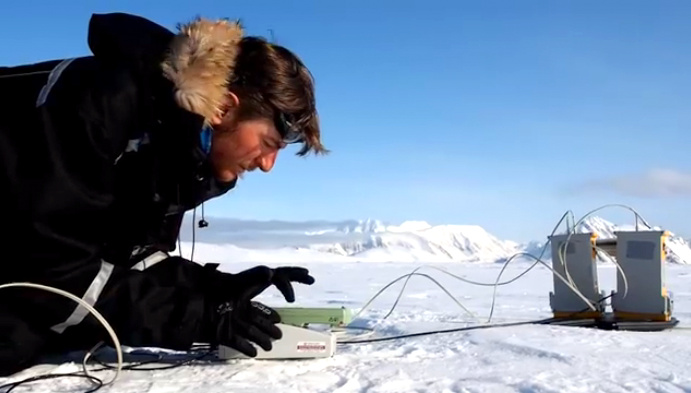- Details
Content
Newsletter n°2, 15 February 2017
In this newsletter:
- Your second online newsletter
- More online lessons coming
- Arctic competition - deadline approaching!
- Why is the Arctic fascinating? Watch our new video.
- Spreading the word about EDU-ARCTIC
Your second online newsletter
This is the second online newsletter that you get as a part of the EDU-ARCTIC family, dedicated to keeping you informed about the latest developments and key happenings within the EDU-ARCTIC project, as well as to remind you about the very useful educational tools that are available to you as educators.
More online lessons coming
 The EDU-ARCTIC consortium is very proud to launch more online lessons on various Arctic research topics. These include the very first webinars conducted by UVSQ (France) and Arctic Portal (Iceland). We also have a special guest scientist – an ornithologist from “Polish Birds”, a non-governmental organization. If you want to learn more about POLAR VORTEX, find out WHY is all the fish in the NORTHERN SEA or follow the FLIGHT OF THE SWANS – sign in.
The EDU-ARCTIC consortium is very proud to launch more online lessons on various Arctic research topics. These include the very first webinars conducted by UVSQ (France) and Arctic Portal (Iceland). We also have a special guest scientist – an ornithologist from “Polish Birds”, a non-governmental organization. If you want to learn more about POLAR VORTEX, find out WHY is all the fish in the NORTHERN SEA or follow the FLIGHT OF THE SWANS – sign in.
Have you ever wondered how length of day and night depend on latitude? Or how dark is the polar night? Or what do reindeer have in common with the Earth rotation angle? The online lesson Polar night and midnight sun - one year in the Arctic will answer all these questions.
Everything that you wanted to know about the most famous Arctic animal – the polar bear – will be included into the online lesson, “Polar bear - the king of Arctic”.
Fisheries have always had a great impact on Arctic communities, providing them with a valuable source of protein and seafaring experience. In the online lesson Northern seas, why is all the fish there? it will be explained why these parts of the ocean are so rich in fish and what might happen to fish stocks as a consequence of global warming.
You can get an overview of the online lessons that are already available by having a look at the calendar of upcoming lessons.
As there are limitations to the number of schools that can participate in each lesson, make sure to sign up early for the online lesson that interests you! After some time, a recording of each online lesson will also be available in our video archives to consult at your leisure.
To accompany each online lesson, the Polarpedia is available as an online, multilingual glossary to help students understand key terms for each lesson. Over time, as more online lessons are added, more terms will be added to the Polarpedia.
If you have any questions regarding the online lessons, please don’t hesitate to contact Agata Goździk: This email address is being protected from spambots. You need JavaScript enabled to view it.
Arctic competition - deadline approaching!
How is your work going on your application? We can’t wait to read your ideas! It won’t be long now – remember, the applications (short summary) must be uploaded by the 1st of March (by midnight), while full proposals must be submitted by the 20th of March (also by midnight). Stay creative!
For more details, please consult the Arctic competitions page on the EDU-ARCTIC website, as well as the competition rules and the information sheet about the competition.
We've also prepared additional FAQs for participants with useful information and tips.
If you have any questions about the competition, you may contact Lis Mortensen: This email address is being protected from spambots. You need JavaScript enabled to view it. or Barbara Biskopstø Hansen: This email address is being protected from spambots. You need JavaScript enabled to view it..
Why is the Arctic fascinating? Watch our new video.
What draws young people to the Arctic? What is the future of Arctic research? Meet current and future researchers from northern polar regions. They come from very different places and have various motivations. What’s yours? We hope you’ll enjoy our new project video.
We look forward to seeing you at the upcoming online lessons and the best of luck with competition applications!
Spreading the word about EDU-ARCTIC
We hope that as members of the EDU-ARCTIC community, you will help us spread the word about the project! We have many promotional materials, including videos available in eight languages on the EDU-ARCTIC YouTube channel plus promotional brochures in seven languages available on our website.
And don’t forget to visit our website for the latest news, follow our Facebook page, Twitter feed and Instagram account. We also have an EDU-ARCTIC profile on LinkedIn, which you are welcome and encouraged to follow, as it can help you to make contact with other professionals in STEM education.
We look forward to seeing many of you at the upcoming online lessons and hope to see some of you compete in the first Arctic competition!
- Details
Newsletter n°1, 11 January 2017
Content
1. Welcome!
2. Your online newsletter
3. Online lessons begin
4. Introductory webinar
5. Arctic competitions launched
6. Spreading the word about EDU-ARCTIC

Welcome!
We would like to extend a very warm welcome to you as a member of the EDU-ARCTIC community and wish you all the best for 2017!
We hope you find our educational tools and program of great value to you as an educator, and we encourage you to give as much feedback as possible about the online lessons and educational tools so that we can make your EDU-ARCTIC experience as valuable as possible to your educational activities.
Your online newsletter
As part of the EDU-ARCTIC family, you will receive regular newsletters dedicated to keeping you informed about the latest developments and key happenings within the EDU-ARCTIC project, as well as to remind you about the very useful educational tools that are available to you as educators.
Online lessons begin

The EDU-ARCTIC consortium is very proud to announce the start of online lessons on various Arctic research topics. The lessons are transmitted from research stations and institutions in the Arctic and elsewhere in Europe directly to classrooms, where students and teachers can interact with researchers and ask questions directly to them.
You can get an overview of the online lessons that are already available by having a look at the calendar of upcoming lessons. Remember, all times are listed in UTC (GMT+0), so make sure to convert to the right time zone if necessary!
The first online lesson broadcast from the Polish Hornsund research station, which will focus on the Polar Night, takes place on Thursday, 12 January, starting at 9:00 am UTC. Unfortunately, due to limitations in the number of schools that can participate in each lesson, there are no more availabilities for this first lesson. However, online lessons will be re-broadcast at later dates if there is significant interest in the lesson, so keep your eye on the calendar and make sure to sign up early for the online lesson that interests you! After some time, a recording of each online lesson will also be available in our video archives, so you can consult each lesson at your leisure.
Lessons will by default be given in English, as this is a necessary language to know in order to be able communicate within the scientific community. To accompany each online lesson, the EDU-ARCTIC Polarpedia is available as an online, multilingual glossary that will help students understand terms key to each online lesson. The Polarpedia is officially open to the public on Thursday 12 January, just in time for the first online lesson. Over time, as more online lessons are added, more key terms will be added to the Polarpedia.
Introductory webinar
And for those who would appreciate some guidance on how to use the online lessons and other educational tools the EDU-ARCTIC project has to offer, there are still places available to join an introductory webinar for teachers new to the project on Thursday 19 January. Make sure to register early, to ensure that you have a spot!
If you have any questions regarding the online lessons, the Poalrpedia, or the introductory webinar, please don’t hesitate to contact Agata Goździk at: This email address is being protected from spambots. You need JavaScript enabled to view it..
Arctic competitions launched

Have you ever wondered what it might be like to take part in scientific research in the Arctic? Well, now you have a chance to win a trip to find out!
The EDU-ARCTIC consortium is proud to announce the launch of the first Arctic competition, in which students and teachers can win a trip to visit research stations in the Arctic.
Students from secondary schools across Europe and their teachers are invited to enter the competition to win a chance to visit research stations for 10-14 days in the Faroe Islands, Iceland, northern Norway, or Svalbard, and take part in actual research that is being conducted at these stations!
Two competitions will be held over the course of the project: one during the spring semester of 2017, and one during the spring semester of 2018. Winners of the 2017 competition will have the chance to visit research stations in either the Faroe Islands or Iceland, while winners of the 2018 competition will have the chance to visit research stations either in northern Norway or Svalbard.
Teams of one student between the ages of 13 and 20 along with one of their teachers can enter the competition. The student-teacher teams will be asked to develop a research or innovation project related to the Arctic environment. Students and teachers from all across Europe are eligible to enter he competition.
Applications for the first Arctic competition to win a 10-14 day trip to the Faroe Islands or Iceland opens today! Applications can be submitted online via the EDU-ARCTIC portal between Tuesday 10 January and Wednesday 1st March by midnight. Following the application submission, full proposals describing each project must be submitted by Monday 20 March by midnight. Projects will then go through a process of review and shortlisting before winners of the first competition are announced in May.
For more details, please consult the Arctic competitions page on the EDU-ARCTIC website, as well as the competition rules and information sheet about the competition.
If you have any questions, you may contact Lis Mortensen at: This email address is being protected from spambots. You need JavaScript enabled to view it. or Barbara Biskopstø Hansen at: This email address is being protected from spambots. You need JavaScript enabled to view it.
Spreading the word about EDU-ARCTIC

This past autumn, members of the EDU-ARCTIC consortium have been busy promoting the innovative education project, whether at the White House Arctic Science Ministerial side event in Washington, DC, at the Arctic Circle Assembly in Reykjavik, at the Fête des Sciences at the Université de Versailles St Quentin-en-Yvelines, with a delegation of Turkish dignitaries visiting Poland, and during the Gateway to the Arctic event in Potsdam. That’s a lot of visibility!
We hope that as members of the EDU-ARCTIC community, you will also spread the word about the project to members of your professional network. We have been creating all kinds of promotional materials, including promotional videos available in eight languages on the EDU-ARCTIC YouTube channel plus promotional brochures in seven languages and counting, available on our website.
And don’t forget to frequently visit our website for the latest news, follow our Facebook page, subscribe to our Twitter feed and visit our Instagram account in order to get the latest developments about the EDU-ARCTIC project and STEM education. We also have an EDU-ARCTIC profile on LinkedIn, which you are welcome and encouraged to follow, as it can help you to make contact with other professionals in STEM education.
We look forward to seeing many of you at the upcoming online lessons and hope to see some of you compete in the first Arctic competition!

 This project (EDU-ARCTIC) has received funding from the European Union’s Horizon 2020 research and innovation programme under grant agreement No 710240. The content of the website is the sole responsibility of the Consortium and it does not represent the opinion of the European Commission, and the Commission is not responsible for any use that might be made of information contained.
This project (EDU-ARCTIC) has received funding from the European Union’s Horizon 2020 research and innovation programme under grant agreement No 710240. The content of the website is the sole responsibility of the Consortium and it does not represent the opinion of the European Commission, and the Commission is not responsible for any use that might be made of information contained.